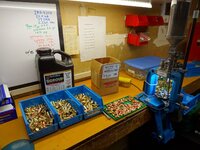Bronze Supporter
- Messages
- 1,915
- Reactions
- 1,462
I been reloading since i was a little shaver with my pops. Thats 40 years ago!Learning to roll is dead simple. Now with the net there is a ton of free info and demo's too. Strait wall pistol calibers are a great place to learn. I have long tried to warn others after every panic. This will not be the last one. Few seem to learn. Learn to roll, get dies and components for any caliber you shoot. Then worry about setting aside ammo. Next panic, there will be another, and another, if you run low on factory you can just roll. I rarely bother to roll any more but keep all the stuff to do so. If I need it the stuff it there again. With some stuff the savings are quite good too. Mainly I just want to be able to make ammo if it gets to where I can't buy it. The stuff you set aside never goes bad, store it well and it's always there.
Do it! Very therapeutic.
Matt












